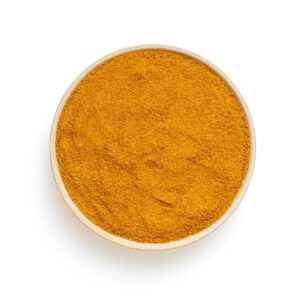Over the years, turmeric and immunity have garnered significant attention in the medical field, due to their potential impact on the immune system. Turmeric, a golden spice derived from the Curcuma longa plant, contains a powerful compound called curcumin. This natural ingredient has been celebrated for centuries in traditional medicine for its anti-inflammatory properties and ability to combat a variety of ailments. Research suggests that turmeric may enhance our body’s immune response by stimulating natural killer cells, dendritic cells, and t cells, all of which play a crucial role in fighting infections and maintaining overall health.
Turmeric and Immunity: How I Enhance My Body’s Defenses

One major aspect of the relationship between turmeric and immunity lies in its antioxidant properties. Curcumin effectively neutralizes unstable molecules called free radicals that can cause cellular damage and inflammation, which can potentially lead to various health issues like heart disease and neurodegenerative diseases.
By reducing inflammation, turmeric supplements may offer support in managing autoimmune conditions and dealing with the inflammatory response to infection. Additionally, curcumin has shown the ability to modulate cytokine production in the body, which includes both inflammatory cytokines and anti-inflammatory cytokines. This modulation supports the immune system’s ability to adapt and respond appropriately to foreign invaders.
However, taking turmeric or its extract, curcumin, in supplement form might not be suitable for everyone. Some individuals could experience negative effects, particularly those taking blood thinners or facing an increased risk of kidney stones. A systematic review of clinical studies reveals that curcumin’s absorption rate could be quite low, but combining it with other substances like black pepper may enhance its bioavailability.
Despite these limitations, incorporating more turmeric into the diet has shown beneficial effects on overall health. Further research is needed to better understand how-tos and optimize turmeric and curcumin supplementation for improved immune support.
Turmeric’s Immune System Boosting Benefits
While turmeric and immunity may not be a common connection in most people’s minds, this vibrant spice, derived from the Curcuma longa plant, actually packs a surprising punch when it comes to supporting the immune system. Turmeric’s key component, curcumin, has been widely studied for its numerous health benefits, with its anti-inflammatory properties being particularly recognized.
One benefit turmeric brings to the immune system is its ability to enhance the function of dendritic cells. These vital immune cells play a role in initiating an immune response and providing essential immune defenses. Research suggests that curcumin might help boost the activity of these cells, which can contribute to a more robust immune response.
Another vital factor in turmeric’s relationship with immunity lies in its antioxidant properties. Curcumin has powerful antioxidant effects that help neutralize harmful free radicals in the body, which in turn can reduce inflammation, ultimately protecting against inflammatory diseases and heart disease. In fact, a systematic review published in Adv Exp Med Biol found that curcumin’s antioxidant properties could provide significant benefits for individuals with metabolic syndrome, preventing oxidative stress and resultant inflammation.
Turmeric’s potential influence on t-cells and b-cells should also not be ignored. These critical immune cells, known as natural killer cells, are responsible for identifying and eradicating infected or abnormal cells in the body. Curcumin has been shown to increase the activity of these essential players in the immune system, ultimately helping to fight infections and curb the development of neurodegenerative diseases like Alzheimer’s or Parkinson’s.
Some important considerations to keep in mind when incorporating more turmeric into your diet or considering turmeric supplements include potential interactions with medications and varying potency among different supplement forms. People taking blood thinners should consult with their healthcare provider before adding turmeric to their diet or supplement regimen, as it could potentially cause negative effects. Meanwhile, for those aiming to reap turmeric’s full benefits, research has found that consuming curcumin in combination with black pepper can significantly enhance its absorption in the body.
Turmeric and its active component curcumin, boast a myriad of immune system-boosting benefits, from enhancing dendritic cell function to promoting a healthy inflammatory response. As with any dietary change or supplement, it’s essential to speak with a healthcare provider before incorporating significant amounts of turmeric into your routine, especially for those with underlying health conditions or taking medications.
How to Incorporate Turmeric into Your Diet

Incorporating turmeric into your diet has become increasingly popular, particularly thanks to its potential role in boosting immunity. Turmeric is especially known for its antioxidant properties and ability to impact immune responses. Here, I’ll walk you through several suggestions on how to add this golden spice to your meals.
One of the most natural ways to include turmeric in your diet is by adding it to your everyday cooking. You can sprinkle it on vegetables, add it to stir-fries, soups, and even use it as key ingredient in smoothies. If you’re not a fan of its taste, consider pairing turmeric with black pepper as it not only improves the flavor but also enhances the absorption of curcumin, the active compound in turmeric.
For those who prefer a more concentrated dose, turmeric supplements are readily available in most health stores. These supplements often come in capsules or tablets and can contain standardized extracts of turmeric or curcumin. Remember to consult a healthcare professional before starting new supplements, especially if you’re taking medications like blood thinners or have an increased risk of heart disease.
There’s an abundance of research suggesting that turmeric and its active components have various health benefits including:
– Reducing inflammation, thanks to their anti-inflammatory properties
– Positively impacting immune response by enhancing the activity of dendritic cells
– These cells process antigens and present them to T and B cells, crucial for immune system function
To further illustrate the potential benefits of turmeric on immunity, a systematic review found that curcumin can significantly modulate inflammatory cytokines and neurodegenerative diseases.
However, it’s important to note that high doses or prolonged use of turmeric supplements could lead to some negative effects. Some studies report gastrointestinal issues in individuals who consume large doses of turmeric. Additionally, excessive intake might result in increased production of anti-inflammatory cytokines, which, in turn, could impair the immune system’s ability to fight infections.
In conclusion, incorporating more turmeric into your diet may have beneficial effects on your immune system. Whether you choose to add turmeric to your food or take it in supplement form, remember that moderation is key. Ultimately, aim for a well-balanced diet offering a wide range of nutrients to ensure optimal immune function and overall health.
Final Thoughts
I’ve explored the potential benefits of turmeric and immunity throughout this article, highlighting its role in enhancing the immune system. Turmeric, primarily through its active ingredient curcumin, is known for its antioxidant properties and ability to stimulate natural killer cells.
Turmeric supplements have been shown to enhance the immune response by influencing dendritic cells and modulating the production of both anti-inflammatory and inflammatory cytokines. These cytokines have a critical role in the immune system, helping to regulate the body’s response to inflammatory diseases and neurodegenerative diseases.
I also touched on the potential benefits of turmeric extract for T cells, a vital component of the immune system. Curcumin has demonstrated the ability to help regulate the inflammatory response by inhibiting the activation of transcription factors and reducing cytokine production. Alongside its anti-inflammatory properties, curcumin has also been shown to react with free radicals, demonstrating its powerful antioxidant effects.
However, it’s important to be cautious when taking turmeric supplements, especially when combined with blood thinners or other substances. Some research suggests that curcumin may have negative effects, such as an increased risk of cell death. A systematic review of clinical studies is necessary to better understand the potential risks and benefits of turmeric supplementation.
In light of these findings, I believe that:
– Turmeric, especially in the form of curcumin, can potentially strengthen the immune system through its antioxidant properties.
– Turmeric supplements may help modulate the production of inflammatory and anti-inflammatory cytokines, thus regulating immune response.
– More research is needed to fully understand the implications of taking turmeric supplements, particularly in combination with other medications.
In conclusion, turmeric holds promising potential for boosting immunity and overall health, thanks to its powerful antioxidant and anti-inflammatory properties. Still, it’s essential to conduct further research to better understand the possible risks and to determine the most effective dose for its medicinal uses. By keeping these factors in mind, individuals can make informed decisions to effectively incorporate turmeric into their daily routines for improved immune function and overall well-being.

